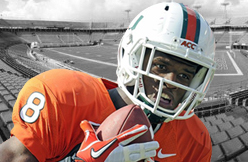CORAL GABLES — Tommy Streeter appears to have made a $2 million mistake.
The University of Miami's leading receiver last year, Streeter - along with four other teammates - opted out of his final season of eligibility in December to enter the NFL Draft.
Some draft analysts graded the 6-foot-5, 219-pound Streeter as a second-round pick, not surprising since he impressed teams at the NFL Combine in February by running 40 yards in 4.4 seconds, the eighth-fastest clocking.
But by the time the NFL Draft arrived last Thursday, Streeter's stock was tumbling. Questions regarding his route-running and a "one-year wonder" label seemed to overshadow his rare combination of size and speed.
Instead of the second round, Streeter was left hanging until the Baltimore Ravens took him with the 198th overall pick late in the sixth round.
According to a long-time NFL agent with access to contract information, the average second-round draft choice in 2011 earned $2.2 million in guarantees. A sixth-rounder received an average of $101,000 guaranteed.
"Tommy Streeter should have come back to school," ESPN's Todd McShay said this week. "He knew the risks. I thought he could have used more time."
Streeter wasn't alone. His four other underclassmen teammates, with the possible exception of Dolphins' third-round pick Olivier Vernon, all were selected below where they were projected. In the case of defensive tackle Marcus Forston, he wasn't even drafted.
Lamar Miller may have been an even bigger loser than Streeter. ESPN's Mel Kiper Jr. included Miller in first-round mock drafts into February and most analysts listed the 5-11, 212-pound sprinter as one of the top four running backs in the draft.
But Miller, dogged by concerns about a surgically-repaired shoulder, lasted until the fourth round and 97th overall selection, where the Dolphins traded up for him.
How much money did Miller leave on the table? Judging by last year's rookie contracts, he may have lost millions.
Stanford's Sione Fua, the 97th overall selection in the 2011 draft, signed a four-year contract for $2.6 million. Offensive tackle Derrick Sherrod, the final pick of the first round in 2011, signed a four-year deal for $6.6 million. Sherrod also received a $3.3 million signing bonus compared to a $514,000 bonus for Fua.
So who's to blame?
You can start with the players themselves. Each of the UM quintet chose not to petition the NFL Draft Advisory Board, a committee of general managers and personnel directors who advise underclassmen on their draft status.
"In 15 years of coaching, I've never seen that," UM coach Al Golden said last month. "It's a function of what the young person is listening to."
Which brings us to Drew Rosenhaus, the agent for all five underclassmen.
Rosenhaus declined an interview request for this story. But during his weekly appearance on WQAM this week, Rosenhaus sidestepped a question regarding his clients' choice not to query the NFL Draft Advisory Board and didn't assign himself any responsibility for what, in retrospect, seems like poor decisions by the players to turn pro.

(palmbeachpost.com



